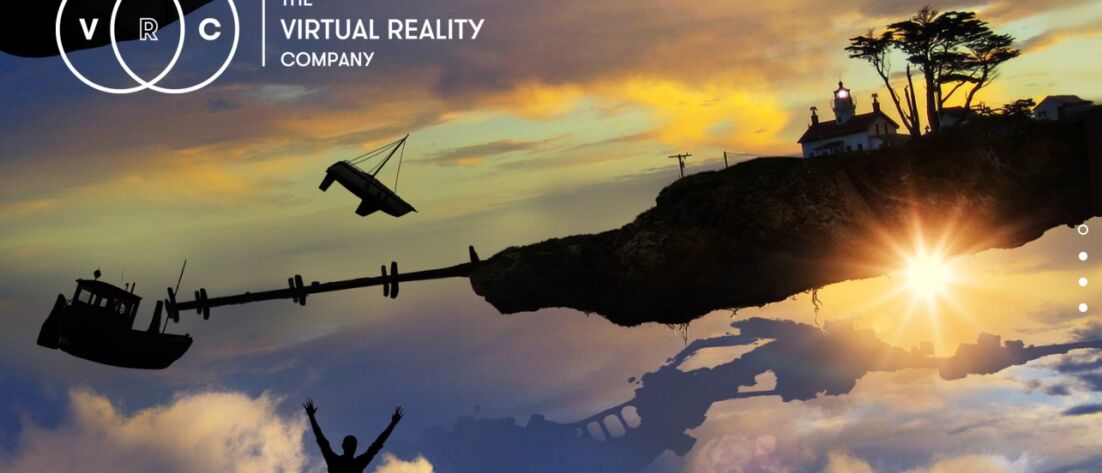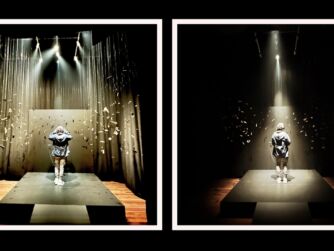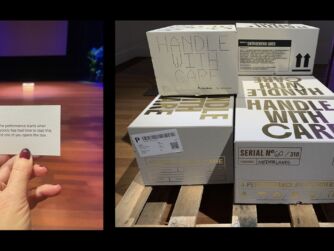The Virtual Reality Company is a 360-degree video production studio in Hollywood that has Steven Spielberg as an advisor. I had a chance to catch up with Joshua Watson, Emily Cooper, & Chris Edwards at Oculus Connect 2 to get a sneak peak of some of their premiere storytelling experiences that they’re working on. They haven’t announced any specific projects yet, but they’re working on a pilot for a VR show as well as an immersive documentary. Some of the VRC founders come from a pre-visualization studio called Third Floor, Inc, and they created a immersive traveling attraction for The Marvel Experience which the VRC says these types of theme park attractions have a lot of similarities to creating a VR experience. The VRC seems to be really well positioned to provide a bridge between video game and film franchises and it’s worth keeping an eye on them as they’ve got a lot of connections within the industry.
LISTEN TO THE VOICES OF VR PODCAST
Become a Patron! Support The Voices of VR Podcast Patreon
Theme music: “Fatality” by Tigoolio
Subscribe to the Voices of VR podcast.
Rough Transcript
[00:00:05.452] Kent Bye: The Voices of VR Podcast.
[00:00:11.879] Joshua Watson: Hi, my name is Joshua Wasson. I'm with VRC, the virtual reality company.
[00:00:15.542] Emily Cooper: Hey, my name is Emily Cooper. I'm also with VRC, the virtual reality company.
[00:00:20.740] Chris Edwards: And I'm Chris Edwards, one of the founders of the Third Floor Previous Studio and also founder of VRC.
[00:00:27.962] Kent Bye: And so what is VRC?
[00:00:29.863] Chris Edwards: VRC is a production company or a studio of premium VR experiences, also with an emphasis on storytelling in VR. So a little less the gaming or interactive side and a little more on the directed storytelling aspects of VR.
[00:00:47.102] Kent Bye: Great. And are these like 360 degree videos or are these CG or what kind of medium do you have?
[00:00:53.790] Emily Cooper: Well, we are kind of across the board. I right now I'm producing a live action documentary. So that's just one of the things that we're working on. And I'm sure Chris can tell you a little bit more about the spectrum of work that we're doing.
[00:01:04.858] Chris Edwards: So we're working with some major Hollywood filmmakers on some very ambitious projects that will be series of VR experiences starting with a pilot episode and then various other episodes that you can enjoy and experience if you like the first one. And so this is more like a VR television studio than, say, a one-off game experience production effort. By that we mean we're working with major studio partners as well as the filmmakers' own IP and creations to bring that to the world in a new and more immersive way.
[00:01:42.196] Kent Bye: Great. And so, yeah, maybe you could talk a bit about the language of storytelling within VR and kind of your approach to how you're going to be able to tell stories in this medium that's different than, say, what you could do in a normal 2D film.
[00:01:55.595] Emily Cooper: Yeah, I'll go. So I have a little bit of a theatre background. I studied theatre in college and right after college I moved out to the East Coast to work at a theatre festival, a Berkshire theatre festival, it's a really great theatre festival out there and I didn't quite feel at home and so I moved to LA to pursue working in film and yet again I didn't feel that I'd found the right fit and then I started to learn about VR and at first I thought, oh this isn't for me, I'm not a gamer and then I delved more into the depth that VR can bring to storytelling and I think it's a perfect marriage with a theater background and a film background and then it just brings a broader language because we can completely immerse people into worlds that you've always wanted to go a little bit more into and so I think it creates a new language of immersive experience as well as creating a lot of empathy. So our company does some phenomenal work and I have a keen interest in documentary and live action and I think that what we can do is take one world and broaden that world to an experience that you've never had before.
[00:02:56.044] Chris Edwards: It's really amusing to me every time we go to conferences, the same topics come up again and again. What's the language of VR? And honestly, you can't think too much about the future without looking at the past. As Emily mentioned, I mean, really, people before the dawn of cinema, We're actually creating theater that still exists today that is a combination of blocking, lighting, and sound. And so those cues are what we use every day to create really immersive VR experiences and to sort of subtly direct you in the right direction. make you feel either a part of the experience or an observer. And the transition from those modes of participant or observation is an important part of what we, I think, are learning how to do quite effectively at VRC.
[00:03:43.947] Emily Cooper: I mean, I think the beautiful thing, like Chris is touching on, is that VR also gives us tools to take traditions from the past and also break through with new technology to bring us into a completely new experience.
[00:03:55.690] Chris Edwards: It really is the merging of the games world and the feature film world and that's what's so exciting is we're both learning about each other's camps whereas we didn't often foray into gaming if you were a guy that built feature films and the same is true there was a lot of people in gaming that were admirers of fantastic film franchises Where our former company, The Third Floor, came in was, you know, we were the bridge between those worlds. We were agnostically authoring cinematic storytelling for all of these different markets, including theme park experiences, which is a lot like VR, you know. It's just live action, real world, practically built VR. That's why I think that we're feeling quite prepared for this, this wave of enthusiasm for VR that's about to happen, and that's what's so exciting. This is the calm before the storm. Next year, in first and second quarter, when the premium headsets start coming out, that's when we're really going to start to see this pick up. and a lot of traction. I bet you're going to see a lot of mothers fighting each other at Walmart and Target for the premium device that they must buy for their family for the holiday season in 2016.
[00:05:09.633] Joshua Watson: I compare doing virtual reality to playing with toys as a kid. When you sit in your bedroom and you line up all your G.I. Joes and your Transformers and your Legos and you stack them all up and you stage a little event. You're kind of tweaking it around and making all the characters interact with one another and all the toys. Now, sitting in VR is very much like that. You're setting this stage and you're creating this story with the environment. And it honestly really feels like I'm a kid again, but now I'm doing it in the computer and I'm doing it in CG and sometimes also planning it in for live action. But it really, it harkens back to that early fun you had as a child with all of your toys.
[00:05:48.487] Kent Bye: Yeah, I think one dimension of VR is that it is 360 degrees and so you have a little bit less control as a director as to pointing where people are paying attention to. But it's also a challenge in terms of how do you design an experience that actually utilizes that full 360 degrees space. What is behind people that, you know, gives them an incentive to look at, you know, why does it need to be 360 as opposed to just a 2D. What are the type of approaches that you're doing in order to make it a full 360 experience rather than just a narrow or 90 degree experience?
[00:06:22.165] Chris Edwards: So you don't always have to use the full 360 even though the medium enables 360. So you can start off with something that resembles an experience that's in a rectangle, you know, and what if you could use selectively the moments when you want to reveal the full scope of feeling immersed in 360. So, that's just one example of many ways in which we are excited to use the 360 medium, is that a lot of people are producing experiences that are all about, you know, it's full on, you're in the experience the whole time, you're surrounded in this stuff, and it becomes sometimes a one-trick pony of like, okay, this is really fun, but after a while, this is gonna bog me down, I'm gonna feel a little bit bored with this repetitive action, no matter how exciting it is, right? What we're interested in doing is creating more of a curated experience that starts somewhere, goes on a journey, actually saves a little bit for the big reveal. I mean, like when you go to an IMAX film, even at a science museum, you'll see little snippets of historical footage and then eventually they show the space shuttle and it's the full screen in IMAX and you're dwarfed by the scale of it. That's the kind of thing you can do in VR and it's exciting to have that as an extra tool in our tool chest. And it really is about that sort of self-control. That's what directors do. And so we're setting up shop at VRC to be that source for world-class filmmakers, designers, directors, studios that need to know what VR is good for and how you can create the best experience for the end user.
[00:08:08.615] Kent Bye: So there's also Oculus Story Studio. They also have Henry here. And I'm just curious, from your perspective, seeing something like Henry and what kind of insights and takeaways you get from that experience.
[00:08:19.404] Chris Edwards: Henry is great to see the capability of connecting with a character when the character can look into your eyes. And I think that that's going to be key. And that's where the game tech really is going to come into play to enhance storytelling. Because what you could do is you could create that animation with the eyes not connecting. And yeah, if you're in the right place at the right time, it might feel like there's empathy between you and that eye line. But with game technology, you can actually turn on a subtle functionality where if you're in a general area, he'll probably look at you, and he's going to look directly into your soul. And that, I think, is the biggest innovation that I saw in this particular experience in Henry.
[00:09:03.662] Kent Bye: In terms of empathy, you mentioned that and I know Chris Milk has given a talk about VR as being an empathy machine and I'm curious about your specific approach of how you're going to cultivate empathy with this medium of VR.
[00:09:15.462] Emily Cooper: That's a great question. It really is. I think that there are multiple studios and multiple visionaries going about that in different ways. For me, I can speak from the experience that I've had. At VRC, we've had a lot of experiences across the board, but my personal experience is in working on one of the documentaries that we have. I think when you approach that from a documentary, the beauty of VR is the immersive experiences, which can also cultivate empathy. The way that we approach that is we actually took our viewer on a journey. And so you're able to create a relationship. So normally when you watch a documentary, very much POV from the outside, you're looking in. And so what we are experimenting with is creating not an approach of looking in, but an approach of being one with someone on their journey. in a way that we haven't really done a lot before. So now you're almost sitting there with someone holding their hand through maybe a difficult time, maybe an exciting time. And so we are literally firsthand experiencing what these people are going through. And I think that, you know, that's the approach that we took with the documentary that we shot this summer is just a first-hand experience. And I think that that amount of interaction, without interaction in a way, can really cultivate a whole new world of documentary making.
[00:10:41.197] Kent Bye: Finally, what do you guys see as kind of the ultimate potential of virtual reality and what it might be able to enable?
[00:10:48.513] Chris Edwards: Well, you know, the thing that excites me about virtual reality in general is that I think it's actually going to accelerate our ability to have access to culture, to other people in other areas, and essentially it's a really excellent way to accelerate our learning. Because the average person that can't afford to go to the Louvre or travel to that concert or sit in on that lecture at that university can now, over time, access all of those experiences. And honestly, they'll learn faster, they'll get more inspired, they might go in a completely different direction with their career goals and their life's mission. And I think that is going to have a significant effect when you look at humanity and where we were pre-VR, AR, and post-VR, AR. It's going to be a significant climb of maybe even human intelligence.
[00:11:45.935] Emily Cooper: I totally agree with everything Chris is saying. There are so many platforms, so many facets of life that VR can touch, and I think once we get past the first adopters, once the technology catches up, once the storytelling is hand-in-hand with the technology, there's such a broad consumption waiting for VR and it's going to touch gamers, it's going to touch entertainment, it's going to touch music, it's going to touch documentaries, it's going to touch education and medical and I think it's going to be a beautiful journey seeing how different companies approach that and also you know in not even five years I think we're going to see a broad consumption of virtual reality. I would say
[00:12:22.990] Joshua Watson: If you look at the generation pre-internet, the ones that grew up without the internet access, you know, like myself, even in the 80s, it was a different life. And now, you know, you meet young people who grew up with always having the internet. They can't even imagine a world without the internet. And I believe that's something that happened with virtual reality. I think that as virtual reality spreads across the globe, there will be entire generation that doesn't remember what life was like without it. I think it's going to be so integrated. It's not going to be like these one-off experiences. I think it's going to be part of everyday life, much like smartphones are a part of everybody's, every few minutes you're holding your smartphone, you're interacting with your smartphone. I think that virtual reality and augmented reality will be just integrated into your everyday lives in a way that we can't even quite imagine right today.
[00:13:07.525] Chris Edwards: That's going to take a team effort to achieve that, and that's why we're all here at Oculus Connect to come together with kindred spirits. I mean, it is really amazing here. I feel very honored to be here with these colleagues and partners, and it's just a really exciting time to be involved in the birth of a new medium, a medium that will probably not change in our lifetime again in this significant way. Awesome.
[00:13:33.536] Kent Bye: Great. Well, thank you, guys. Thank you. Thank you so much. Thank you very much. And thank you for listening! If you'd like to support the Voices of VR podcast, then please consider becoming a patron at patreon.com slash voicesofvr.




